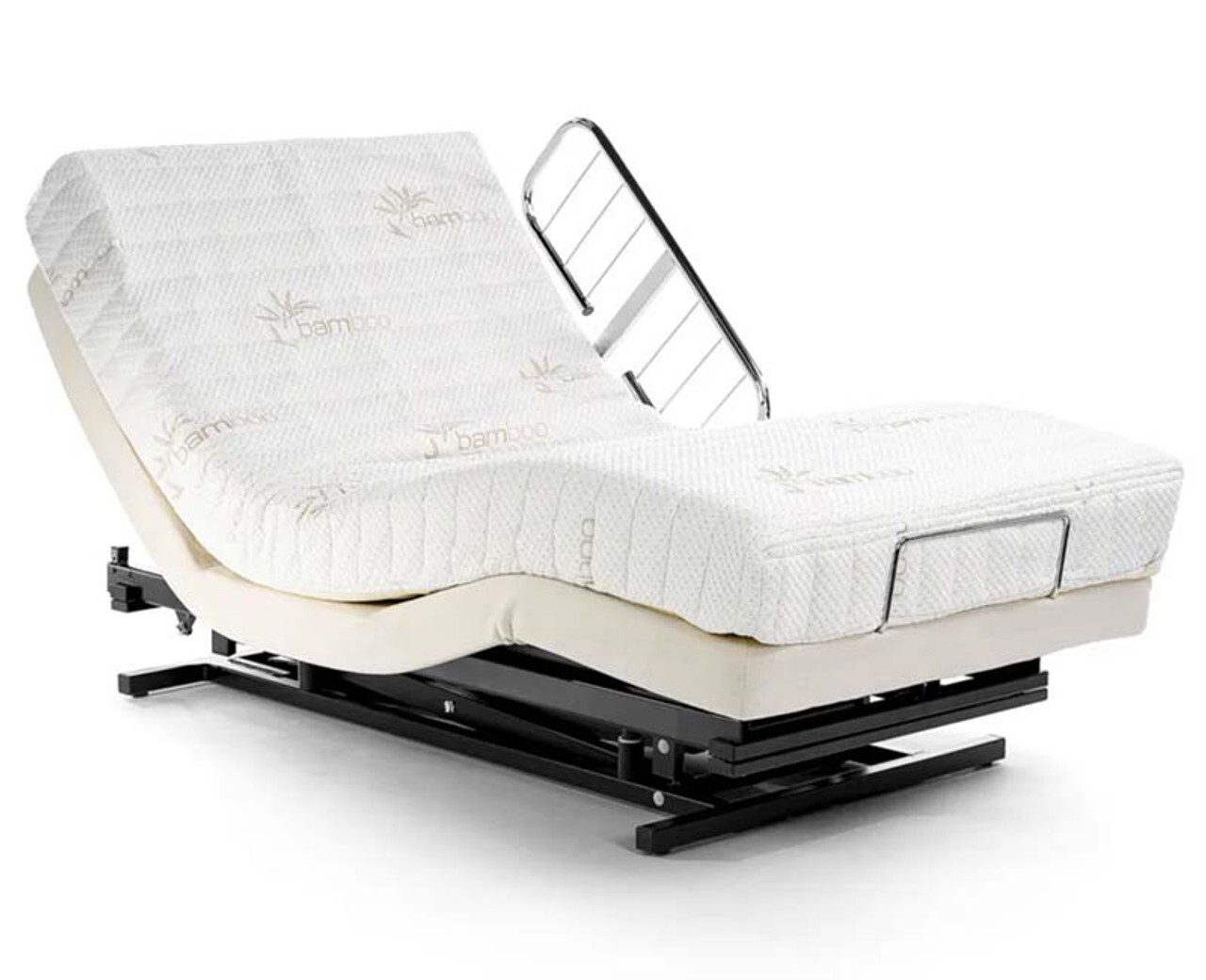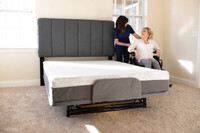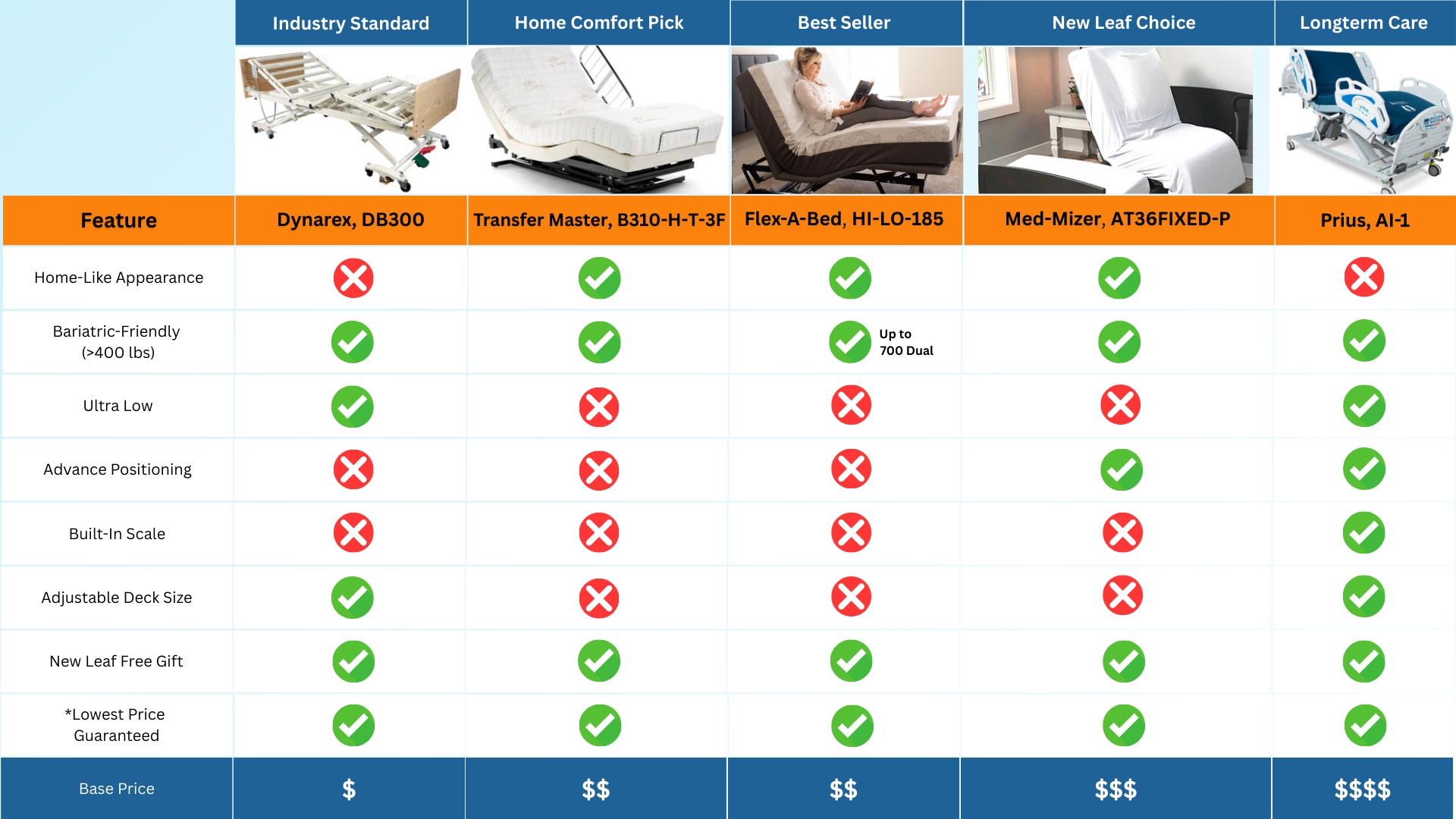FREE SHIPPING ON ORDERS OVER $75
Renting vs. Buying a Hospital Bed for Home

 When considering a hospital bed for home use, one of the biggest decisions is whether to rent or buy. Both options offer distinct advantages depending on your needs, budget, and the duration for which the bed will be used. For short-term recovery, renting a bed can provide flexibility and cost savings. On the other hand, purchasing a bed may offer long-term value and stability for individuals with ongoing care needs.
When considering a hospital bed for home use, one of the biggest decisions is whether to rent or buy. Both options offer distinct advantages depending on your needs, budget, and the duration for which the bed will be used. For short-term recovery, renting a bed can provide flexibility and cost savings. On the other hand, purchasing a bed may offer long-term value and stability for individuals with ongoing care needs.
Understanding the benefits and limitations of each option can help you make a choice that aligns with your circumstances. Let’s break down the pros and cons of renting versus buying a hospital bed, compare costs, and look at which option may be best suited for different situations.
Pros of Renting vs. Buying
Advantages of Renting a Hospital Bed
Renting a hospital bed is often the ideal solution for individuals who need the bed temporarily. Whether recovering from surgery, injury, or a short-term illness, renting allows you to access a hospital bed without the commitment of ownership.
One of the primary benefits of renting is flexibility. Many rental services offer a wide variety of beds, allowing you to choose one that meets specific needs without a long-term commitment. Renting also reduces upfront costs, as the initial expense is generally lower than purchasing a bed outright. Additionally, rental providers often handle maintenance and repairs, ensuring that the bed remains functional throughout the rental period.
Advantages of Buying a Hospital Bed
 Buying a hospital bed is a worthwhile investment for individuals requiring long-term or permanent care. When purchased, a hospital bed offers stability and the freedom to customize it with accessories, such as specialized mattresses, side rails, or overbed tables. Ownership also allows you to choose a bed that precisely meets your or your loved one’s needs.
Buying a hospital bed is a worthwhile investment for individuals requiring long-term or permanent care. When purchased, a hospital bed offers stability and the freedom to customize it with accessories, such as specialized mattresses, side rails, or overbed tables. Ownership also allows you to choose a bed that precisely meets your or your loved one’s needs.
 Over time, buying a hospital bed can be more cost-effective than renting, particularly for individuals needing extended or indefinite use. Once the initial purchase is made, there are no ongoing rental fees, making ownership more economical for long-term scenarios. Additionally, owning a hospital bed means that you control maintenance and upkeep, ensuring it remains in optimal condition for as long as needed.
Over time, buying a hospital bed can be more cost-effective than renting, particularly for individuals needing extended or indefinite use. Once the initial purchase is made, there are no ongoing rental fees, making ownership more economical for long-term scenarios. Additionally, owning a hospital bed means that you control maintenance and upkeep, ensuring it remains in optimal condition for as long as needed.
Cost and Flexibility Comparison
Cost Analysis
When considering the financial aspect, renting a hospital bed typically involves a monthly fee, which can vary based on the bed type, rental company, and additional accessories. Rental costs may range from $100 to $300 per month for standard beds, with advanced or specialized beds costing more. While renting reduces upfront expenses, the costs can add up over time, especially if the bed is needed for several months.
Buying a hospital bed, on the other hand, involves a one-time cost. Prices for hospital beds vary widely, with basic models starting around $500 and advanced electric models reaching $3,000 or more. For individuals with long-term care needs, purchasing can be more cost-effective than paying monthly rental fees.
Flexibility of Renting
Renting provides flexibility in both duration and type. Many rental providers offer month-to-month options, allowing you to return the bed when it’s no longer needed. This is particularly advantageous for short-term recovery or situations where care needs may change. Additionally, rental services often allow for upgrades or changes if the patient’s requirements evolve over time, making it a versatile option for temporary setups.
For individuals with uncertain health needs, renting allows you to adjust your setup without the commitment of ownership. For example, if a patient’s mobility improves and a hospital bed is no longer necessary, it can simply be returned, avoiding the hassle and expense of selling a purchased bed.
Maintenance and Responsibility
Maintenance in Rental Agreements
One significant advantage of renting a hospital bed is that maintenance is typically included in the rental agreement. Rental providers are responsible for delivering the bed in working condition, handling repairs, and even replacing the bed if it malfunctions. This removes the burden of upkeep from the patient or caregiver, allowing them to focus on recovery and care.
This support can be especially beneficial if technical issues arise, as the rental provider will address any mechanical problems or wear-and-tear maintenance. This can save time and expense, making renting an appealing choice for those who prefer not to deal with maintenance responsibilities.
Maintenance When Buying
When you buy a hospital bed, maintenance and repair responsibilities fall on you. While many hospital beds are durable and reliable, any repairs or replacements needed over time must be handled by the owner. This may involve sourcing parts or hiring a technician, which can be an added expense.
However, owning a hospital bed gives you control over the quality and timing of maintenance. Regular upkeep can extend the bed’s lifespan, ensuring it remains a valuable investment. Additionally, most purchased beds come with warranties, providing coverage for repairs during the initial period after purchase.
Which Option Is Best for Whom?
Renting Is Ideal for Short-Term or Temporary Needs
For individuals needing a hospital bed for a limited time, such as during recovery from surgery or while managing an acute illness, renting is often the most practical choice. Renting allows you to access a hospital bed without committing to a large purchase, offering flexibility if your health needs are expected to change. Additionally, renting works well for families who may not have the storage space or long-term need for a bed once it’s no longer required.
Short-term needs may also be covered by health insurance, and some insurance plans offer partial or full rental coverage, making renting a more affordable option for temporary use.
Buying Is Beneficial for Long-Term or Permanent Use
For those with chronic conditions, mobility limitations, or ongoing care requirements, buying a hospital bed is generally more cost-effective and convenient. Ownership provides the freedom to customize the bed with specialized accessories and adjustments, catering to specific health needs and personal preferences. For individuals planning for long-term care, owning a bed can reduce the overall cost compared to continuous rental payments.
Buying may also be a good option for those who prefer control over maintenance and upkeep. With ownership, you can ensure that the bed is well-maintained and tailored to your needs without relying on external providers.

When to Consider Insurance Coverage
Before making a decision, it’s important to explore whether your health insurance covers the cost of renting or purchasing a hospital bed. Many insurance plans provide partial or full coverage for hospital beds if deemed medically necessary. Some plans may only cover rentals, while others allow for purchase, so check with your provider to understand your options and maximize potential savings.
Final Thoughts
Choosing between renting and buying a hospital bed ultimately depends on your specific health needs, budget, and the expected duration of use. Renting offers flexibility and a low commitment for short-term needs, allowing easy access to a hospital bed without the cost of ownership. For long-term or permanent needs, buying a hospital bed can be a worthwhile investment that provides stability, customization options, and potentially significant cost savings over time.
By carefully considering the pros and cons of each option, as well as consulting insurance coverage, you can make an informed decision that ensures comfort, safety, and value. Whether you decide to rent or buy, the right hospital bed will provide essential support, transforming the home environment into a space of healing and comfort.

